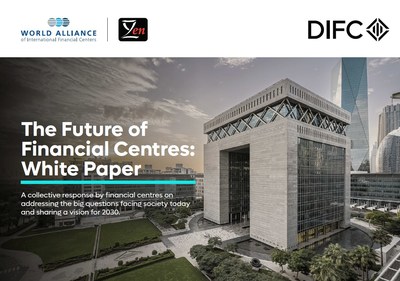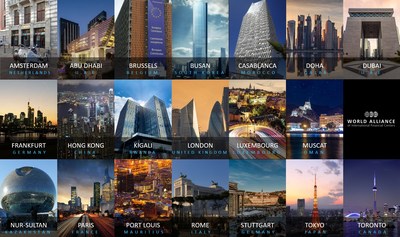- WAIFC produced a whitepaper in partnership with the Dubai International Financial Centre and the Z/Yen Group.
- Financial centers – and the organizations that represent them – are spearheading efforts to strengthen their jurisdictions’ financial markets, business environments, and innovation ecosystems to enable sustainable global growth.
- In 2030, financial centers will be green, smart, innovative, customer-focused, digital, and inclusive, and will play a critical role in attracting and retaining the best talent.
- Continuous collaboration and sharing of knowledge will be key to supporting growth across all sectors in the future.
BRUSSELS, July 1, 2022 /PRNewswire/ — The World Alliance of International Financial Centers (WAIFC), in collaboration with the Dubai International Financial Centre (DIFC) and the Z/Yen Group, today released a white paper focusing on how financial centers around the world are responding to the challenges facing society today and a shared vision for 2030.
Titled, ‘The Future of Financial Centers,’ the white paper was developed following the Annual General Meeting of the WAIFC, where a number of CEO-level representatives from financial centers worldwide gathered in DIFC to share insights on policy design and regulatory interventions to enable sustainable growth, the Fourth Industrial Revolution (4IR) and human capital development.
Whilst focusing on the role financial centers play in supporting global economic growth, offering investment for businesses, providing access to financial services for individuals, and enabling trade, the white paper includes how financial centers:
- operate both through collaboration and competition, offering internationally competitive business environments whilst at the same time partnering with other financial centers to facilitate trade and knowledge transfer.
- are encouraging growth in sustainable finance by developing sustainability strategies, shaping regulation, developing new financial instruments, and contributing to national policy developments.
- have encouraged regulatory change to enable digital finance to help start-ups operate at low cost, support the development of digital ID and Know Your Customer (KYC) systems, and back initiatives to widen access to financial services through mobile platforms.
- are working on attracting, upskilling, retaining, and reskilling talent by establishing tailored training, developing networks that support local workforces, and providing attractive working environments.
- are fostering links between regulators and market participants to ensure that regulatory changes are understood, urging the development of international regulatory standards, providing regulators with commercial insights, and encouraging competition.
The paper further examines the contribution that financial centers can make over the next decade in addressing the challenges relating to sustainability, demography, inclusivity, and 4IR.
Commenting on the white paper, Arif Amiri, CEO of DIFC Authority and WAIFC Board Member, said: "The financial services and technology sectors play a significant role in helping our economies prosper. The white paper, issued by DIFC and our partners, contains important recommendations that need to be converted into objectives that are best delivered through collaboration between financial centers. Embedding the deliverables will allow financial centers to increase their contribution to the global economy, whilst providing opportunities for clients to innovate, be more inclusive and sustainable."
Jennifer Reynolds, Chair of the World Alliance of International Financial Centers (WAIFC), concluded: "The global financial industry is amid a dramatic wave of change that started during the financial crisis in 2008. Since then, rapid changes in technology, demand for sustainable finance, and the pandemic have continued to drive change. The pace of change will increase, and financial centers must focus their priorities on becoming green, smart, innovative, customer-focused, digital, and inclusive. This white paper strengthens our spirit of collaboration between leading financial centers from across the globe."
Professor Michael Mainelli, Chairman at Z/Yen Group, added: "While financial centres exist in a competitive system that encourages high performance, that system equally exhibits strong elements of cooperation and collaboration that encourage constant improvement and renewed targeting of society’s deeper needs. It has been a privilege to contribute to setting out a vision for the social and ethical future of financial centers."
The white paper also highlighted that financial centers should continue collaborating and sharing best practices for supporting growth across all sectors to ensure their ambitions for a better future are realized. Just as clustering financial and professional services in financial centers encourages innovation, the collaboration between financial centers will lead to better sustainable development outcomes.
Please download the white paper here.
Contact:
- Jochen Biedermann, WAIFC, 339739@email4pr.com,Tel.: +496994418092
SOURCE World Alliance of International Financial Centers (WAIFC) AISBL


